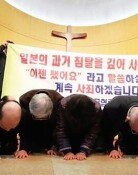Independence of Broadcasting Policy Threatened
Independence of Broadcasting Policy Threatened
Posted January. 21, 2002 09:39,
The Korean Broadcasting Commission (KBC), which was launched as an independent institution holding decisive power on broadcasting policies and administrational power in March, 2000, is in fact in the state of `coma` due to the resignation of the chairperson Kim Jong-Ki, and voices urging general reformation on the broadcasting policies, including the way to organize the commission.
But the government and the ruling party are reportedly arranging a former minister Mr. K, the representative of a broadcasting company Mr. K and a lawyer Mr. H, who contributed to the launch of current government, as a successor, which is seriously threatening the independence and quality of broadcasting.
Experts criticize, "Negotiating the allotment of commission by the political bodies resulted in despecialization and irresponsibility of the KBC. Reformation of the system on the whole is urgent."
While the U.S. Federal Communications Commission (FCC) has 5 commissioners, 4 of whom were lawyers specializing in trade or monopoly, KBC, which modeled itself upon the FCC, has 8 commissioners, only 2 of whom are broadcasting experts and rest of whom are party members or contributors connected to the current government.
The KBC has stopped making policy decisions and deliberations for last several months due to the internal strife, and the company does not realize the actual state of sexually explicit material, violence, and indirect advertisements shown on the TV programs. Due to the operational vacuum, KBC cannot draw a first sketch for the blue print of future Korean Broadcasting, preparing for the unification of broadcasting and communications in the 21st century.
It particularly raised worries that the possibility of biased broadcasting may increase in heralding the presidential and local governmental elections if KBC does not supervise the fairness of the reports for its operational paralysis.
eo@donga.com







